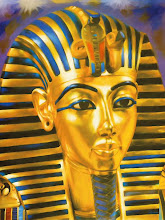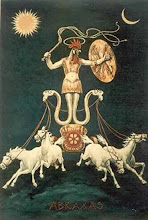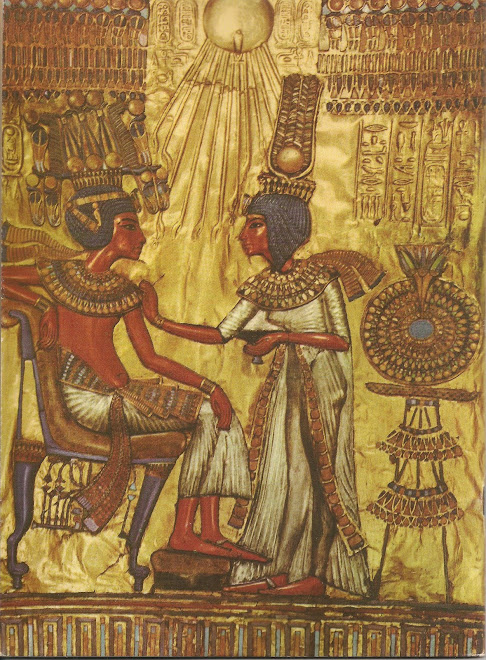quarta-feira, 9 de junho de 2010
Thelema
Thelema is a religious[1] philosophy that was developed[2] by the early 20th century British writer and ceremonial magician Aleister Crowley. He believed himself to be the prophet of a new age, the Aeon of Horus,[3] based upon a religious experience that he had in Egypt in 1904.[1] By his account, a possibly non-corporeal being that called itself Aiwass contacted him and dictated a text known as The Book of the Law or Liber AL vel Legis, which outlined the principles of Thelema.[1][4]
Thelema is essentially a polytheistic religion, with the deities adopted from Ancient Egyptian religion, namely Nuit, Hadit and Ra-Hoor-Khuit. The faith follows the idea that the 20th century marked the beginning of the Aeon of Horus, in which a new ethical code would be followed; "Do what thou wilt shall be the whole of the Law". This statement indicated that followers, who are known as Thelemites, should seek out and follow their own True Will[5] rather than their ego's desires.[6] The religion also emphasizes the ritual practice of Magick as well as mysticism.
The word "Thelema" itself is the English transliteration of the Koine Greek noun θέλημα: "will", from the verb θέλω: to will, wish, purpose. As Crowley developed the religion, founding an organization known as the A∴A∴ to propagate it,[7] he wrote widely on the topic, producing what are collectively termed the Holy Books of Thelema. He also included into it ideas from occultism, Yoga and both Eastern and Western mysticism, especially the Qabalah.[8]
Thelemites — and other people — have interpreted and applied Crowley’s work in widely different ways,[9] sometimes leading to harsh disagreements.[10][11]
( extract source - http://en.wikipedia.org/wiki/Thelema )
Marcadores:
aeon of horus,
ancient egypt,
deities,
hermeticism,
magick,
mysticism,
occultism,
qabalah,
sex magick,
tantra,
the book of the law,
Thelema_,
yoga
Temple
A temple (from the Latin word templum) is a structure reserved for religious or spiritual activities, such as prayer and sacrifice, or analogous rites. A templum constituted a sacred precinct as defined by a priest, or augur.[1] It has the same root as the word "template," a plan in preparation of the building that was marked out on the ground by the augur. Templa also became associated with the dwelling places of a god or gods. The word "temple" dates to about the 6th century BCE.[2] Despite the specific set of meanings associated with the religion of the ancient Rome, the word has now become quite widely used to describe a house of worship for any number of religions and is even used for time periods prior to the Romans.
( extract source - http://en.wikipedia.org/wiki/Temple )
More:
( http://en.wikipedia.org/wiki/Egyptian_temple )
( http://en.wikipedia.org/wiki/Roman_temple )
( http://en.wikipedia.org/wiki/Fire_temple )
Marcadores:
A∴A∴,
deities,
gnosticism,
gnosticluciferianism,
hermeticism,
luciferianism,
magick,
occultism,
orders,
OTO,
satanism,
theistic satanism,
Thelema_
Thoth
Thoth[1] was considered one of the more important deities of the Egyptian pantheon. In art, he was often depicted as a man with the head of an ibis or a baboon; these animals were sacred to him. His feminine counterpart was Seshat.[2] His chief shrine was located in the city of Khmun,[3] later renamed Hermopolis Magna during the Greco-Roman era[4] (in reference to him through the Greeks' interpretation that he was the same as their god Hermes) and Eshmûnên in the Coptic rendering. In that city, he led the local pantheon of the region known as the Ogdoad, and its eight principal deities. He also had numerous shrines within the cities of Abydos, Hesert, Urit, Per-Ab, Rekhui, Ta-ur, Sep, Hat, Pselket, Talmsis, Antcha-Mutet, Bah, Amen-heri-ab, and Ta-kens.[5]
He was often considered as the heart, which, according to the ancient Egyptians, is the seat of intelligence or the mind, and tongue of the sun god Ra; as well as the means by which Ra's will was translated into speech.[6] He had also been related to the Logos of Plato[6] and the mind of God[7] (see The All). In the Egyptian mythology, he has played many vital and prominent roles in maintaining the universe, including being one of the two deities (the other being Ma'at, who was also his wife) who stood on either side of Ra's boat.[8] Later in ancient Egyptian history, Thoth became heavily associated with the arbitration of godly disputes,[9] the arts of magic, the system of writing, the development of science,[10] and the judgment of the dead.[11]
( extract source - http://en.wikipedia.org/wiki/Thoth )
Abraxas
The word Abrasax (Gk. ΑΒΡΑΣΑΞ, which is far more common in the sources than the variant form Abraxas, ΑΒΡΑΞΑΣ) was a word of mystic meaning in the system of the Gnostic Basilides, being there applied to the “Great Archon” (Gk., megas archōn), the princeps of the 365 spheres (Gk., ouranoi).[1] In Gnostic cosmology, the 7 letters spelling its name represent each of the 7 classic planets—Sun, Moon, Mercury, Venus, Mars, Jupiter, and Saturn.[2]
The word is found in Gnostic texts such as the Holy Book of the Great Invisible Spirit, and also appears in the Greek Magical Papyri. It was engraved on certain antique gemstones, called on that account Abrasax stones, which were used as amulets or charms. As the initial spelling on stones was 'Abrasax' (Αβρασαξ), the spelling of 'Abraxas' seen today probably originates in the confusion made between the Greek letters Sigma and Xi in the Latin transliteration. The word may be related to Abracadabra, although other explanations exist.
There are similarities and differences between such figures in reports about Basilides' teaching, ancient Gnostic texts, the larger Greco-Roman magical traditions, and modern magical and esoteric writings. Opinions abound on Abraxas, who in recent centuries has been claimed to be both an Egyptian god and a demon.[3] The Swiss Psychologist Carl Jung wrote a short Gnostic treatise in 1916 called The Seven Sermons to the Dead, which called Abraxas a God higher than the Christian God and Devil, that combines all opposites into one Being.
( extract source - http://en.wikipedia.org/wiki/Abraxas )
More info on these sites:
http://www.ocultura.org.br/index.php/Abraxas
http://www.iawwai.com/Abraxas.htm
http://www.whiterosesgarden.com/Nature_of_Evil/Demons/List_of_Demons/A_contents/abraxas.htm
http://www.themystica.com/mystica/articles/a/abraxas.html
http://demons.monstrous.com/abraxas.htm
http://www.sintoniasaintgermain.com.br/abraxas.html
Also related to Abraxas:
http://en.wikipedia.org/wiki/Abracadabra
http://en.wikipedia.org/wiki/Abrahadabra
Marcadores:
abracadabra,
Abraxas,
deities,
demons,
gnosticism,
gnosticluciferianism,
magick,
thelemic gnosticism
Subscrever:
Comentários (Atom)










.jpg)
.jpg)









+001.jpg)
+001.jpg)

+001.jpg)










+001.jpg)
+001.jpg)






+001.jpg)
+001.jpg)
+001.jpg)

.jpg)


